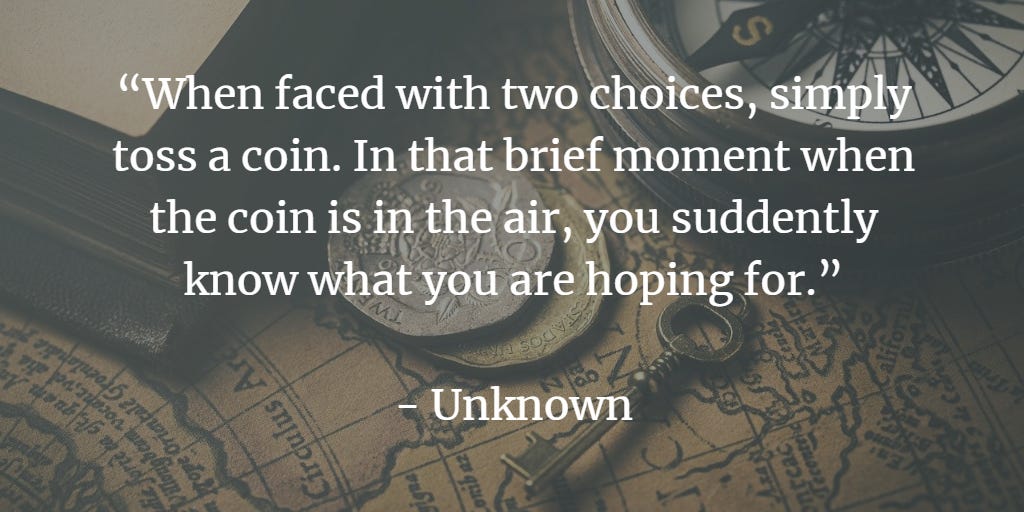Sunday Reads #119: What do you value?
Plus some notes on optimism, sci-fi, chimpanzees, and social media managers.
Welcome to the latest edition of Sunday Reads, where we'll look at a topic (or more) in business, strategy, or society, and use them to build our cognitive toolkits for business.
If you’re new here, don’t forget to check out the compilation of my best articles: The best of Jitha.me. I’m sure you’ll find something you like.
And here’s the last edition of my newsletter, in case you missed it: Sunday Reads #118: The Remote Revolution is coming.
This week, let’s talk about our core personal values. How this abstract, wishy-washy stuff can have some very concrete and tangible benefits for our careers and lives. The article from Taylor Pearson I share below convinced me, and I’ve written down my own list of values too.
And some link love of course - one of the best sci-fi I’ve read, chimpanzees, the Mars Rover, and social media managers gone wild.
Here's the deal - Dive as deep as you want. Read my thoughts first. If you find them intriguing, read the main articles. If you want to learn more, check out the related articles and books.
[PS. If you like what you see, do forward to your friends. They can sign up with the button below.]
1. What do you value?
Last week, I read How to discover your core personal values and use them to make better decisions, by Taylor Pearson.
I thought it would be a fluff piece like many articles on such a topic. But I was pleasantly surprised.
What are core personal values?
Personal values are broad concepts that can be applied over and over again across a range of circumstances, as opposed to narrow answers to specific questions.
Whether you are conscious of them or not, you have values for every part of your life — parenting values, investing values, work values, and health values. There are also more overarching life values.
Why should you maintain a list of personal values?
Because they'll help you take the most complex decisions.
Wait a sec, how do you (we) actually make complex decisions?
Wrong answer: We list all our options and rate them across 4 uncorrelated metrics. Then we choose the best one.
Right answer: We do the above, and go with our gut anyway. (But we give "weights" to the different metrics so that the quantitative result matches our intuition).
We might as well have used the hackneyed “toss-a-coin” advice.
When you have a declared list of personal values (even if only to yourself), you can trust your gut to make the right call.
Taylor gives a simple example in his article:
An example of a value would be:
Self-development: to keep growing, advancing, or improving in knowledge, skills, character, or life experience.
This value could help you answer questions like “Should I take a slightly higher paying job where I won’t learn as much, or a lower paying one where I will develop my skills a lot faster?”
Another example is Paul Graham's "run upstairs".
As he says in How to make Wealth:
Use difficulty as a guide not just in selecting the overall aim of your company, but also at decision points along the way. At Viaweb one of our rules of thumb was "run upstairs".
Suppose you are a little, nimble guy being chased by a big, fat, bully. You open a door and find yourself in a staircase. Do you go up or down? I say up. The bully can probably run downstairs as fast as you can. Going upstairs his bulk will be more of a disadvantage. Running upstairs is hard for you but even harder for him.
What this meant in practice was that we deliberately sought hard problems. If there were two features we could add to our software, both equally valuable in proportion to their difficulty, we'd always take the harder one. Not just because it was more valuable, but because it was harder.
We delighted in forcing bigger, slower competitors to follow us over difficult ground. Like guerillas, startups prefer the difficult terrain of the mountains, where the troops of the central government can't follow.
I can remember times when we were just exhausted after wrestling all day with some horrible technical problem. And I'd be delighted, because something that was hard for us would be impossible for our competitors.
There's a second reason too.
There's one more reason why having a defined list of your values is useful.
What gets measured gets managed.
When you call out your values for everyone (or just yourself) to hear, you guarantee that you'll prioritize them in decision making. Instead of chasing something else (e.g., more money but less learning) that isn't important to you in the long run.
Plus, your values can create your own reality distortion field. You can re-deploy your brain's narrative fallacy in a manner that benefits you.
For example, things always seem harder than they actually are. If one of your values is "Run upstairs" or "run towards fires" or "courage", guess what - you'll end up accomplishing a lot of things that are too "hard" for others to even try.
Back to Taylor:
One of my core values is courage.
I discovered this was a core value for me, because I noticed a tendency in myself to pick projects that were not risky enough and have them fail as a result.
I would have the choice between two opportunities, and I would say “this one will almost certainly work, while the other one is a bit riskier, so I’ll do the easy one.”
Then I would start working on the project, and because it didn’t really stretch me, I would get bored or feel like I wasn’t reaching for what I was capable of. That would end with me quitting or doing subpar work.
In cases where I picked the seemingly riskier choice, I became very engaged in the project and while I was working on it, my capabilities grew to be able to actually do it well.
Picking the more courageous choice meant I was more likely to succeed and enjoy the process more.
By adopting courage as a core principle, I was able to identify that repeated failure pattern in myself and fix it.
Taylor goes on to share how you can discover your own personal values. He also shares a laundry list of values - do check them out and see if any resonate with you.
Once you have them, look at them often - say every weekend when you're doing your weekly review. (What, you don't do a weekly review?! 😊)
And remember, values can change over time. It's not that you're flaky, it's that you're growing.
Here are my personal values for 2021.
I'll write more about what each of these means to me in the coming weeks.
#1: Truth. I want to believe what is true.
I want to have accurate beliefs about the world. What does that mean? In the words of Tarski,
If the box contains a diamond, I desire to believe that the box contains a diamond;
If the box does not contain a diamond, I desire to believe that the box does not contain a diamond;
Let me not become attached to beliefs I may not want.
If something is not true, I don't want to believe it just because it's inconvenient to admit I was wrong.
If there is no Santa Claus, then I don't want to believe in Santa Claus.
If I'm not great at writing, then I don't want to believe I'm great at writing. (Rather, I want to work towards it - see the next value).
As you can tell, there's a lot more I want to say on this. I will, soon.
#2: Challenge. I want to keep challenging myself to grow, learn and improve, across all facets of my life.
This is best explained by Eliezer Yudkowsky's notes on "Tsuyoku naritai!", as I shared in Sunday Reads #116:
Tsuyoku is “strong”; naru is “becoming,” and the form naritai is “want to become.” Together it means, “I want to become stronger,” and it expresses a sentiment embodied more intensely in Japanese works than in any Western literature I’ve read.
You might say it when expressing your determination to become a professional Go player—or after you lose an important match, but you haven’t given up—or after you win an important match, but you’re not a ninth-dan player yet—or after you’ve become the greatest Go player of all time, but you still think you can do better.
That is tsuyoku naritai, the will to transcendence.
#3: Courage. I want to be courageous, in all its forms.
Courage is one of the most positive emotions.
#4: Kindness and acceptance.
To be open to and accepting of myself, others, life, etc. And to be helpful.
#5: Optimism.
Optimists in general find it easier to be happy. I'm on that program :).
What are your personal values? Take 15 min this weekend and think about it. And drop me a line - I'd love to know!
[PS. Trevor McKendrick has another way of doing this. He has an annual theme for every year. Sounds like a super-effective way to change your daily attitude.
His theme for 2021 is "Build". Check out his Build 2021: The Annual Theme & Manifesto. And his 2020 manifesto also clicked with me (as you'd guess), Optimism 2020.
Also check out his newsletter, How it actually works. I especially liked this article: Why You Should Ignore Every Founder’s Story About How They Started Their Company. ]
2. The World of Science Fiction.
I read Blindsight by Peter Watts a couple of weeks ago. It's a dark, bleak, absolutely amazing book, unlike any other I've read.
If you like science fiction on "first contact" with aliens, check it out.
The best sci-fi books are often books of philosophy, masquerading as pulp. And on that count as well, Blindsight hits it out of the park.
It has several thought-provoking premises, just one of which is: "Was sentience, or the capacity for self-awareness, a mistake in evolution?"
I won't say more for risk of giving away the plot.
But check out this chimpanzee in the video below. Watch it till the end. Humans can't even begin to attempt what this chimp is doing effortlessly.


3. The Roaring '20s - Perseverance edition.
No account of the Roaring '20s will be complete without the landing of the Perseverance Rover on Mars.
NASA sent a 1000kg robot the size of an SUV (with a mini helicopter inside) on a 7 month journey to Mars. And landed it successfully within 10 seconds of what they had planned ages ago.
That's not the miracle though. The miracle is that it didn't surprise us at all when they succeeded.
And on a lighter note...
Weetabix published a regular consumer engagement tweet on their Twitter...


And then every corporation in THE WORLD jumped on.
KFC, Domino's Pizza, Xiaomi Brazil, MTN Rwanda, NHS UK, UK's intelligence agency,... and the state of Israel?
When every social media manager's bonus depends on viral tweets... the state of Israel decides to unite with the rest of the Middle East.
Guess sometimes Goodhart's Law can be a force for good.
That's it for this week! Hope you liked the articles. Drop me a line (just hit reply or leave a comment through the button below) and let me know what you think.
PS. I’ll slow down to a fortnightly newsletter for the next few weeks, as I’ve been busy on a couple of things, and haven’t been able to read (or write!) as much. Will be back to weekly soon!
As always, hope you’re staying safe, healthy, and sane.
Until next time,
Jitha



